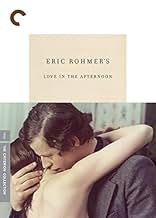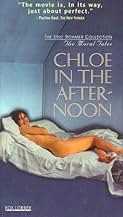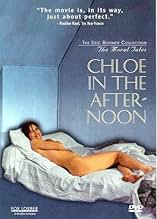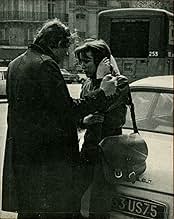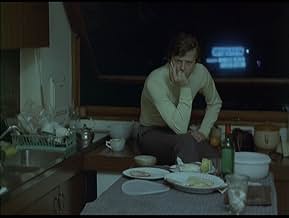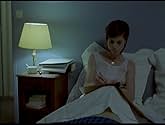Bien que son épouse l'adore, un bourgeois est toujours tenté de courir après d'autres femmes.Bien que son épouse l'adore, un bourgeois est toujours tenté de courir après d'autres femmes.Bien que son épouse l'adore, un bourgeois est toujours tenté de courir après d'autres femmes.
- Réalisation
- Scénario
- Casting principal
- Récompenses
- 1 victoire au total
- Martine
- (as Babette Ferrier)
Avis à la une
Where he fails is in not being able to create three-dimensional characters, or not being able to coax a good performance from an actor. The glaring example of this is Brialy in Le genou de Claire who, wearing a thick beard, seems to sleep-walk through his part: his erotic obsession with a girl's lissome kneecap never comes to life. In the film in question today, Bernard Verley has a bland, pudding-like face that hardly provokes any interest in the viewer. How can such a pallid bourgeois be appealing to a bohemian girl like her?
Francoise Verley as the wife has all the best moments; certainly the final scene is more interesting than what went before. She is not a beautiful woman, but her quiet strength and natural acting style are very convincing. Zouzou does not have the underlying restless energy and fierce sexuality you would expect in a girl who drifts from man to man, and her acting skills are minimal. All in all, a good film when concentrating on the family dynamics, but those scenes at the office between Verley and Zouzou are often tiresome.
Like other movies from Rohmer, "L'Amour l'après-midi" is presented like a book. It's a great combination of cinematic and literary experience.
Out of 100, I give it 84. That's good for *** out of ****.
Seen at home, in Toronto, on November 18th, 2002.
When Chloe (Zouzou), a free-spirited friend he used to know shows up, Frederic finds a release in her companionship and is able to confide in her in a way that he is unable to do with his wife. They spend afternoons together talking about love and relationships. She confesses that she doesn't want to be married but would like to have a child, particularly one with Frederic. The central tension of the film is the choice Frederic must make between his passion for Chloe and his love for his wife. Although he is tempted to have an affair with Chloe, he spends too much time pondering the pros and cons and doesn't act. Chloe on the other hand is in love with Frederic and has a come-what-may attitude toward his entanglements.
Like Jerome (Claire's Knee) and Jean-Louis (My Night at Maud's), Frederic is weak and indecisive and is forever attempting to justify his inability to choose. He stands on the edge of temptation but is never quite ready to jump. Rohmer does not, however, make any moral judgments but hints that Frederic's temptation and pangs of conscience are something most of us go through at some time in our lives.
Though there is a lot of talking in Chloe in the Afternoon, it never seems false or tiresome. This is a very charming film that Pauline Kael called "in every respects, a perfect film". It has a natural rhythm with characters that are so real that you don't want to leave them when the film ends. As Frederic's ultimate choice looms, we are privy to some sharp and insightful dialogue that illuminates the complexity of relationships. The story is told from the husband's point of view and we are left wondering how different it would be if told by his wife. Her tears at the end provide a clue.
Le saviez-vous
- AnecdotesThis film is part of the Criterion Collection, spine #348.
- GaffesAt approximately 1:16 in the film, Chloe opens the store door wearing red shoes matching her dress. In the following scene, she walks down a staircase wearing black shoes which match her stockings.
- Citations
Frédéric: [voice over] That's why I love the city. People come into view, then vanish. You don't see them grow old. What makes the streets of Paris so fascinating is the constant yet fleeting presence of women whom I'm almost certain never to see again. It's enough that they're there, indifferent, conscious of their charm, happy to test its affect on me, as I test mine on them, by tacit agreement, without even the subtlest smile or glance. I feel their seductive power without giving in to it. This doesn't estrange me from Hélène. Far from it. I tell myself these passing beauties are simply an extension of my wife's beauty. They enrich her beauty and receive some of hers in return. She's the guarantee of the world's beauty and vice versa. When I embrace Hélène, I embrace all women.
- ConnexionsFollows La boulangère de Monceau (1963)
Meilleurs choix
Détails
- Date de sortie
- Pays d’origine
- Langue
- Aussi connu sous le nom de
- Six Contes Moraux VI: L'amour l'après-midi
- Lieux de tournage
- Société de production
- Voir plus de crédits d'entreprise sur IMDbPro
Box-office
- Montant brut mondial
- 3 520 $US
- Durée
- 1h 37min(97 min)
- Mixage
- Rapport de forme
- 1.37 : 1

![Regarder Bande-annonce [OV]](https://m.media-amazon.com/images/M/MV5BNDVkYjA1MTItYWFjMi00ZTQ3LTg2NGQtZmZhOTg4MjU1MTg4XkEyXkFqcGdeQXRyYW5zY29kZS13b3JrZmxvdw@@._V1_QL75_UY281_CR5)
